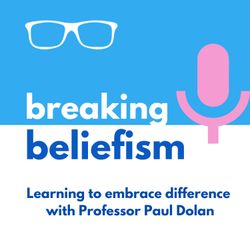Latest episode

11. Season 4 finale
02:29||Season 4, Ep. 11Here’s a quick look back on season 4 of Breaking Beliefism: we covered the power of the medical profession, the nature of consciousness, outrage and silence in organisations, and some very personal stories about pain and addiction.
More episodes
View all episodes

10. Joanna Moncrieff
29:23||Season 4, Ep. 10In this episode, Professor Paul Dolan talks to Joanna Moncrieff, Professor of Critical and Social Psychiatry at University College London. They question the long-held belief that depression is caused by a serotonin deficit. They discuss the behavioural interventions that could prove to be much more effective than medication.
9. Laura Kudrna
29:26||Season 4, Ep. 9In this episode, Professor Paul Dolan chats to his long-time collaborator, Dr Laura Kudrna. They reflect on their collaboration on his happiness books, the importance of social connection, and how making mistakes is an important part of learning.
8. Lee Willows
27:09||Season 4, Ep. 8In this episode, Professor Paul Dolan talks to Lee Willows, the founder of Community Care Gaming. Lee shares his personal journey from never gambling to a gambling addiction to becoming an advocate for safer gambling. They discuss why people don’t ‘get’ gambling addiction and the importance of support networks.
7. Anil Seth
28:51||Season 4, Ep. 7In this episode, Professor Paul Dolan discusses the nature of consciousness with Professor Anil Seth. They discuss free will and the case of the multi-coloured dress.
6. Elaine Lin Hering
26:41||Season 4, Ep. 6In this episode, Professor Paul Dolan chats to Elaine Lin Hering, a specialist in negotiation and dispute resolution and author of Unlearning Silence. They discuss how staying silent can get in the way of effecitve decision-making and the benefits of having diverse perspectives in the workplace.
5. Karthik Ramanna
26:42||Season 4, Ep. 5In this episode, Professor Paul Dolan talks to Professor Karthik Ramanna from the Blavatnik School of Government at the University of Oxford. They discuss the increasing sense of outrage in today’s society, and the challenges for managing polarisation through respectful dialogue - in organisations and beyond.